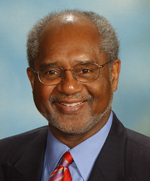October 2013

Alvin Thomas, MD
“Our society tries to conceal racism by numerous devices. Academic institutions raise the cry of ‘excellence.’ Medical institutions today which ignore black students and the health of black Americans cannot be considered excellent,” Moses Alfred Haynes, MD, MPH, wrote in the August 1969 Journal of the American Medical Association.
These words resonated deeply with Alvin Vernon Thomas, Jr., MD, who was then a young faculty member at University of Michigan Medical Center, and would serve to inspire a career dedicated to caring for the underserved in the inner-city areas of Los Angeles and Washington, D.C., as well as addressing the shortage of minority clinicians and researchers.
Dr. Thomas, the longtime chief of pulmonary and critical care medicine at Howard University Hospital who is now semi-retired, is chair of the Society’s new Health Equality Subcommittee of the Health Policy Committee. The subcommittee is charged with creating a plan for addressing health equality issues, an initiative launched by ATS President Patricia W. Finn, MD. He is recognized by his colleagues as an outstanding choice to lead the effort.
“Al was the first African-American president of the American College of Chest Physicians and has been a major force in helping all of us recognize and deal with health care inequality as well as inequality in access to medical education,” says Donald R. McCaffree, MD, of the University of Oklahoma Health Sciences Center. “He is one of the most thoughtful, caring and compassionate physicians with whom I have had the pleasure to work.”
After completing his internship, residency, and fellowship under mentors Winthrop Davies, MD, Robert Green, MD, and Jack Weg, MD, at Michigan in 1976, Dr. Thomas’ understanding of health and social problems in the inner city grew when he joined the faculty of the Charles R. Drew Postgraduate Medical School and began seeing patients as the medical intensive care unit director at the school’s Martin Luther King, Jr. General Hospital.
Situated in the Watts neighborhood of Los Angeles, the school and hospital were being developed at the time by Dr. Haynes and David Satcher, who would become the 16th U.S. Surgeon General. The hospital served almost 750,000 patients, 95 percent of whom were black, Dr. Thomas notes. “There was a rich environment there for being interested in those issues, and a lot was going on in Watts community in those days.”
During his 13 years ascending to leadership positions and visiting patients at the King-Drew Center, he studied tobacco use as well as asthma prevalence in the black community in a number of pivotal studies in which he served as principal investigator, and he helped to establish a smoking cessation program. “The underserved African-American male was particularly hard to reach,” Dr. Thomas says. “There was a substantial need for a preventive care intervention in that group to try to prevent these illnesses.”
Dr. Thomas then focused his National Heart, Lung, and Blood Institute-funded investigations in disadvantaged communities in Washington, D.C. in 1989, when he joined Howard as an associate professor and chief of pulmonary and critical care medicine. Howard, an institution heralded for its long tradition of teaching gifted black students, is where both Dr. Thomas and his father had earned their medical degrees. His father practiced family medicine in their home in Philadelphia and then a small town in south New Jersey. “I didn’t talk to my father enough about medicine directly, but it impacted me a lot,” Dr. Thomas says. “He didn’t proselytize about how great medicine was, but observing him was very important for me.”
More than four decades later, Dr. Thomas finds Dr. Haynes’ critique highly relevant. “The problems and potential solutions that he pointed out in that article are the same ones that are still necessary today,” Dr. Thomas says. “The issue with minority specialists is a global discipline issue in that there’s just not enough minorities in the pipeline. They are not graduating from college in big numbers, and those who do are not going into medicine.”
As head of the Howard University Hospital Pulmonary Fellowship Program, Dr. Thomas has found that most minority graduates pursue the primary care path as they generally prefer practicing in underserved communities. Inspired, he’d like to see more enter the pulmonary, critical care, and sleep fields. “We need to be very active in increasing the numbers of minority physicians,” Dr. Thomas says. “I believe this is possible because many of the patients we serve, particularly in our teaching hospitals, are underserved minority groups, which is also true with inner city hospitals.”
These days, Dr. Thomas is gradually winding down his clinical visits. But his work as chair of the Health Equality Subcommittee has just begun. With his insight and experience, the ATS will be better positioned to address the issue of health disparities as it strives to guide the field of medicine to the true definition of excellence.
Life in ATS
ATS Member Since: 1971
Primary and Secondary Assembly: Clinical Problems, Critical Care
The chair of the Society’s first Health Equality Subcommittee of the Health Policy Committee previously served in the ATS Pulmonary and Critical Care Training Committee, and as president of Metropolitan D.C. Thoracic Society, and in the executive committee of the Maryland Thoracic Society.
“During my years of fellowship and on the faculty at Michigan, it became clear that the ATS played a predominant role in basic research in respiratory diseases and critical care medicine,” Dr. Thomas says. “My mentors were all active members of the ATS, and they had a major role in convincing me that I had an aptitude for the difficult field of pulmonary and critical medicine.”

